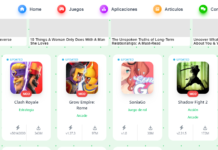Mobile game development has become increasingly popular in the past few years due to the widespread access to smart phones and tablets. Unity Game Engine is a popular game engine many developers use to create amazing mobile games. This article will explore the pros and cons of using the Unity Game Engine for developing mobile games. We’ll look at how it can be beneficial and the potential drawbacks that should be considered.
By understanding both sides of this argument, developers will be better informed when deciding which game engine to use for their projects. So, let’s get started.
About Unity Game Engine for Mobile Game Development
Unity is one of the most popular game engines for mobile game development. It enables developers to create interactive and immersive experiences that can be deployed across various platforms, such as iOS, Android, Windows Phone, and other mobile operating systems. Unity offers an expansive range of features and tools that make it easy for developers to build games quickly and efficiently.
Unity also provides streamlined graphics rendering capabilities, which makes it ideal for developing visually stunning mobile games. The engine also supports real-time lighting and shadows, physics-based animation, and effects. Additionally, Unity includes native support for monetization options like ads, in-app purchases, or subscription services with its IAP system.
A mobile game development company can use Unity to create a comprehensive development environment for creating world-class games. Thus, you can count on Unity for your mobile game development needs.
Pros of Unity Game Engine for Mobile Game Development
There are various reasons why the Unity game engine is well-suited for mobile game development. Mentioned below are the significant benefits of using it:
1. Flexibility: The unity game engine offers high flexibility and allows developers to create games easily and quickly. With its cross-platform development capabilities, you can easily develop a game once and deploy it on multiple platforms. This will save time and resources in the long run, as the same code can be used for multiple devices.
2. Graphical Support: Unity offers great graphical support for mobile game development, enabling developers to create visually appealing games without any extra effort. The user interface is highly customizable, allowing developers to adjust different settings according to their needs, ensuring that the game looks good across various devices.
A unity3D game development company can also easily integrate 3D models and textures into the game, making it stand out from the crowd.
3. Multi-functional Tools: Unity provides access to a wide range of tools, features, and plugins that can be used to create complex, engaging, and feature-rich games. From graphical effects to physics engines, Unity has something for everyone. The platform also offers a wide range of asset store packages, making it easy for developers to access quality assets without spending too much time creating them from scratch.
4. Easy Maintenance: Developing multiplayer games often requires frequent maintenance and upgrades to keep the game running smoothly and efficiently. Unity’s modular architecture ensures that any changes or updates can be easily implemented with minimal effort. This saves time and resources in the long run and reduces the chances of errors due to manual coding.
5. Cost-Efficient: While there is no doubt that Unity is a feature-rich platform, it is also surprisingly cost-efficient. The initial cost of setting up the game engine is minimal compared to other platforms, and developers can even access free resources from the asset store. This makes it an ideal choice for budget-conscious mobile game developers.
Cons of Unity Game Engine for Mobile Game Development
Along with the many benefits, there are a few drawbacks to using Unity for mobile game development:
- The primary disadvantage of Unity is its large file size requirements which can significantly increase the time it takes to install and launch games on mobile devices. Additionally, users will need an internet connection to download the full version of the game from the store, so those without access may be unable to play.
- Developers also experience memory issues when using Unity for mobile game development due to engine technology limitations. These issues can cause slowdowns during gameplay or laggy responsiveness.
- Unity has limited support for plugins and advanced features like custom-level editors, AI systems, and other complex tools that could help streamline development processes. This restriction can slow development and lead to more workarounds than actual solutions.
- Finally, Unity’s licensing cost may be too expensive for some developers or small companies just starting out. The pricing plan also varies depending on the features and complexity of a game, so developers may end up paying more than they originally planned.
While Unity offers many advantages to mobile gaming development, it has several drawbacks that must be considered before investing in the technology. To ensure a successful project, developers should weigh all their options carefully before settling on any engine.
The Bottom Line
The Unity game engine is an effective tool for mobile game development. It offers a wide range of features and benefits that allow developers to create high-quality, engaging games that work across multiple platforms and devices. Potential drawbacks include developing and testing complexity, higher memory usage, and cross-platform issues. However, these can be avoided or overcome with careful planning and management.
With its ease of use and robust feature set, Unity is undoubtedly one of the best choices for developing mobile games in today’s market. Moreover, its affordability makes it an excellent option for independent developers and large teams.





















